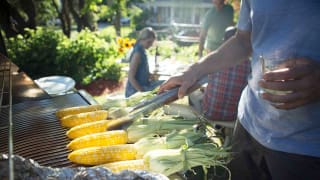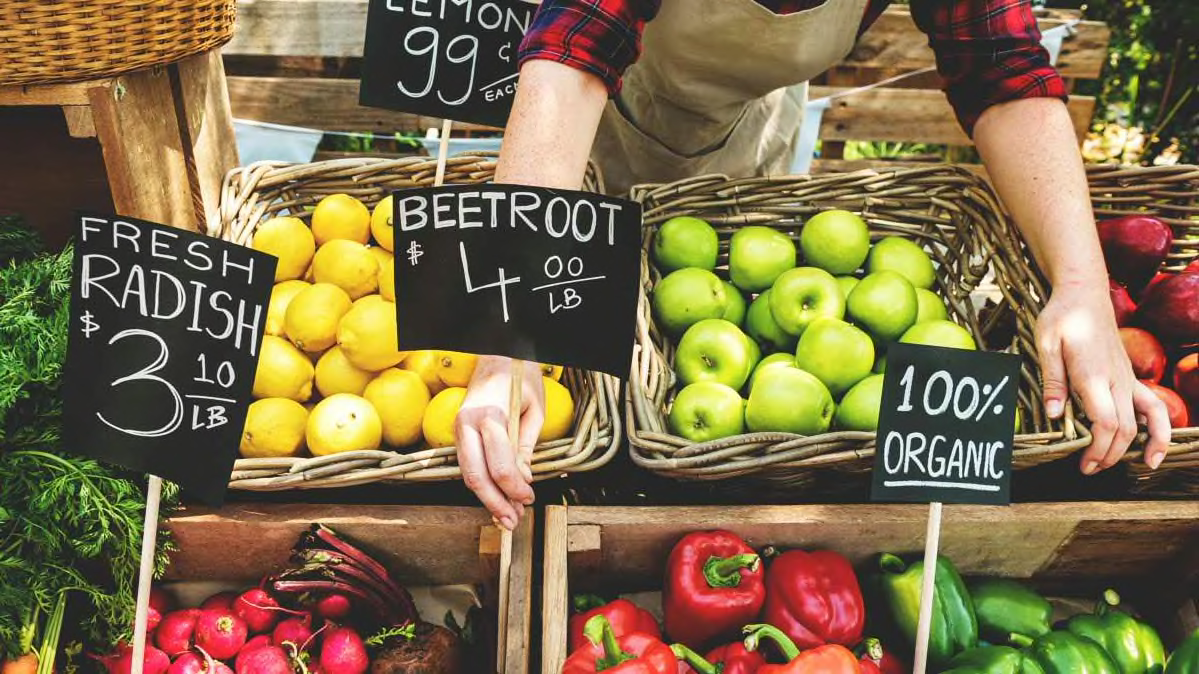
Faster than you can say "kale salad," it seems like yet another farmers market pops up. In fact, there are more than 8,700 registered in the USDA's Farmers Market Directory.
It's easy to understand why farmers markets are popular: They offer fresh fruit and vegetables, plus a chance to meet the people who grow what you're buying. But it's not always clear to shoppers whether the produce heaped up all around is local, organic, or both.
What You Get With Organic
For starters, consumers need to know that local and organic are not the same thing. "In order to call your produce organic, you [the farmer] have to be certified by the USDA," says Joe Masabni, Ph.D., a vegetable specialist at the Texas A&M AgriLife Research & Extension Center in Overton."There is paperwork to fill out, processes to follow, and you have to be approved." A certification agency accredited by the Department of Agriculture checks annually that the farm is complying with organic standards. The exception: Farmers with yearly sales of less than $5,000 do not need to be certified to use the term organic.
Organic growers are prohibited from using most synthetic pesticides and fertilizers, as well as antibiotics (which conventional farmers may use on animals and certain fruit trees). Organic farmers also must take measures to protect water and soil quality.
The USDA Organic seal is "your guarantee that the food you're buying was produced in ways that minimize harm to health and the environment," says Charlotte Vallaeys, senior policy analyst at CR and a sustainability expert.
What to Like About Local
As to the question of what "local" means, the USDA says that more than 85 percent of vendors at farmers markets come from within 50 miles of their location. Markets often permit growers only from a certain geographical radius and can be strict about people selling only what they've produced. But others allow vendors to sell products they haven't grown or produced themselves. Every farmers market sets its own rules and has a manager, so if these issues matter to you, ask the manager for details.
Ideally, Vallaeys says, you'd buy fruits and vegetables that are local and certified organic. But if the food is just grown locally (and doesn't have that organic seal), buying it still has many advantages.
Consider the fact that although many supermarkets carry local produce, much of what you find at stores has been transported 1,200 miles, on average. Produce at farmers markets is often picked ripe and sold within a day. That translates into fresher, more nutritious food because the vitamins and other nutrients haven't had time to break down, says Lauri Wright, Ph.D., R.D.N, assistant professor of nutrition at the University of North Florida.
Making Organic More Affordable
Farmers markets often get a bad rap for being expensive, but Wright says that's not necessarily true. "They're selling what's in season and plentiful, so often they're able to sell it at great prices, she says. "Plus, produce that hasn't been sitting in a truck for days will last longer, and that can save you money by reducing food waste."
In particular you can get good deals on organics. According to the USDA, local, certified organic products at farmers markets are almost always competitively priced when compared with prices at retail stores. Here are some tips for fitting organic into your budget.
Do the prep yourself. If you're a fan of, say, the baby-cut carrots you see in supermarkets, know that you are paying a premium for whole large carrots to be peeled and cut into small pieces. Organic whole carrots tend to be less expensive than the nonorganic baby-cut variety. Ditto for greens; you may be able to get a loose head of organic lettuce for less money than conventional lettuce packaged in a bag or tub.
Snack on organic fruits and vegetables. USDA researchers have found that fresh produce often costs less than sweet and salty snacks.
Buy a ‘share' in a farm program. When you join a CSA (community supported agriculture) program, you pay the farmer at the start of the season. Then you receive a share of the harvest weekly or biweekly throughout the season. In this system, you're likely to spend less than you would if you bought the same goods at the store. Worried you'll have more fruits and vegetables than you know what to do with? You can also preserve them for the winter months by canning, drying, or freezing.
Shop Like a Nutritionist
Eating well isn't always easy—or fun. On the 'Consumer 101' TV show, Consumer Reports' expert, Amy Keating, heads into the grocery store to show you how to make healthy decisions when it comes to food.

















